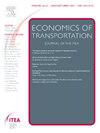Towards a competitive air transport market in Africa: The role of bilateral air service agreements liberalization
IF 1.7
3区 工程技术
Q2 ECONOMICS
引用次数: 0
Abstract
This study examines the impact of bilateral air service agreements (ASAs) on air passenger transport in Africa and quantifies the consumer welfare effects associated with air transport liberalization. Using an unbalanced panel of 71 country pairs from Africa observed over the period 2011–2019, the paper estimates the extent to which bilateral ASA liberalization affects: 1) passenger travel, 2) average air fares, 3) flight frequency, and 4) market competition within a country pair. Our empirical analysis employs the difference-in-differences estimation method and pays close attention to the endogeneity concerns coming from the simultaneity and reverse causality surrounding pricing, demand, and frequency decisions. Our results indicate that both partial and full liberalization of bilateral ASAs lead to a reduction in air fares, and to an increase in air travel demand and flight frequency, respectively. We find no evidence that market competition, as measured by the number of operating airlines, increases following liberalization. After quantifying all the channels through which the policy environment can affect air transport markets in Africa, we find that aviation liberalization generates consumer benefits that are equivalent to a 38 percent drop in air fares, i.e., the price equivalent effect of air liberalization.
迈向非洲竞争性航空运输市场:双边航空服务协定自由化的作用
本研究考察了双边航空服务协定(asa)对非洲航空客运的影响,并量化了与航空运输自由化相关的消费者福利效应。本文利用2011-2019年期间观察到的71个非洲国家对的不平衡面板,估计了双边ASA自由化对以下方面的影响程度:1)乘客旅行,2)平均机票价格,3)航班频率,以及4)国家对内部的市场竞争。我们的实证分析采用差异中的差异估计方法,并密切关注定价、需求和频率决策的同时性和反向因果关系所带来的内生性问题。我们的研究结果表明,双边asa的部分和完全自由化分别导致机票价格的降低,以及航空旅行需求和航班频率的增加。我们没有发现任何证据表明市场竞争(以运营航空公司的数量衡量)在自由化之后会增加。在量化政策环境可以影响非洲航空运输市场的所有渠道后,我们发现航空自由化产生的消费者利益相当于机票价格下降38%,即航空自由化的价格等效效应。
本文章由计算机程序翻译,如有差异,请以英文原文为准。
求助全文
约1分钟内获得全文
求助全文

 求助内容:
求助内容: 应助结果提醒方式:
应助结果提醒方式:


